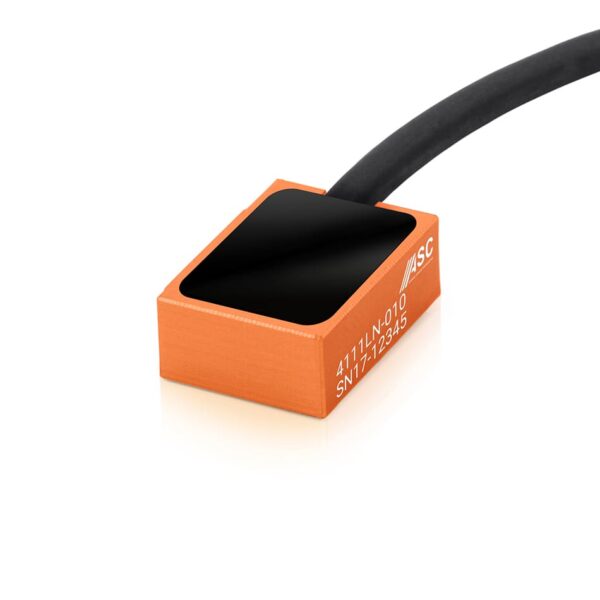
ASC 4111LN
Uniaxial, capacitive
Measurement range: ±2 to ±400 g
Noise density: 7 to 400 µg/√Hz
Frequency range (±5 %): DC to 2000 Hz
Unfortunately, prolonged exposure to vibration may lead to serious potential health risks and other consequences including injury, sick leave and work disruptions as well as long-term disabilities. Some industrial environments where WBV is of particular concern include mining, farming, construction, trucking, shipping, railway, piloting, warehousing and industrial equipment operation.
In any of these settings, making contact with significant vibration loads may be unavoidable. However, easily installed inertial sensor technology available through ASC Sensors allows for continuous monitoring of WBV exposure. To ensure that industry norms and medical standards are being met and that neither your workforce nor your business suffers.
Through its partnership with MMF, German inertial sensor specialist ASC offers the KS963 Seat Pad WBV Accelerometer. This triaxial IEPE (Integrated Electronics Piezo-Electric) transducer has been specifically designed to measure and analyze whole-body vibration according to ISO 2631, ISO 8041, ISO 10326-1 and ISO 7096. The regular or constant monitoring for real-world WBV exposure helps evaluate compliance with these regulations, identify potential risks and implement appropriate mitigation and vibration control measures, as required.
The lightweight WBV accelerometer is embedded in a flexible rubber cushion to capture those vibrations transmitted to the body. The sensor detects the accelerations caused by vibrations and converts them into vibration magnitude values. The latter can be expressed as the root mean square (RMS) acceleration in meters per second squared (m/s²) or as a vibration exposure value (m/s² A[x]) over a specific timeframe. (A[x]) indicates acceleration exposure over a duration of x hours)
A standout feature of the triaxial Seat Pad Accelerometer is its exceptional flexibility. The pad can be embedded in a vehicle or machinery seat for constant monitoring or simply placed on top of the seat for temporary measurements. The versatile sensor can be effortlessly removed from the cushion for calibration or separate purposes. And with its ultra-low profile of just 12mm, extended usage becomes feasible without compromise.
The advanced KS963 Seat Pad Accelerometer combines accuracy and reliability with long-term consistency and stability of measuring outcomes. It has been designed using the latest IEPE technology. The accelerometer features integrated memory for electronic data sheet (TEDS), streamlining data recording and analysis. Its 100 mV/g IEPE output and measuring range of ±60g ensure comprehensive coverage of all vibration measurements.
Equipped with a two-meter cable, the Seat Pad Accelerometer offers ample reach for diverse applications. The sensor’s thoughtful design includes cut slits for easy strap attachment. It comes complete with a transportation case, calibration adapter and adapter plug (Binder 711 to 3 BNC plugs), maximizing convenience and usability.
With all these features, the simple to use KS963 Seat Pad WBV Accelerometer available through ASC Sensors provides a ready, convenient solution for keeping on top of WBV-related challenges in today’s vibrant workplaces. The accurate capturing and long-term monitoring will provide valuable insights into the level of vibration exposure experienced by individuals; beyond that, it will allow you to assess and analyze the root causes of WBV and help manage the risks associated with prolonged vibration exposure.
On that basis, you can take proactive measures to minimize the impact of workplace-related vibrations transmitted to the human body and strengthen the health and well-being of your workforce – as well as that of your business.
Read more: https://www.asc-sensors.de/en/sensoren/ks963b-100-s-en

Uniaxial, capacitive
Measurement range: ±2 to ±400 g
Noise density: 7 to 400 µg/√Hz
Frequency range (±5 %): DC to 2000 Hz

Triaxial, capacitive
Measurement range: ±2 to ±200 g
Noise density: 10 to 680 µg/√Hz
Frequency range (±5 %): DC to 2900 Hz
You are currently viewing a placeholder content from Vimeo. To access the actual content, click the button below. Please note that doing so will share data with third-party providers.
More InformationYou are currently viewing a placeholder content from YouTube. To access the actual content, click the button below. Please note that doing so will share data with third-party providers.
More InformationYou need to load content from reCAPTCHA to submit the form. Please note that doing so will share data with third-party providers.
More Information